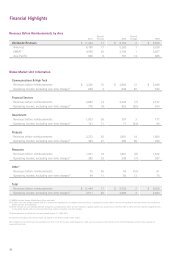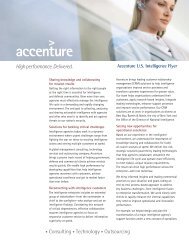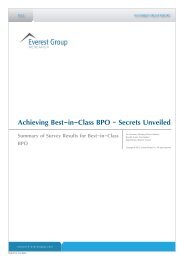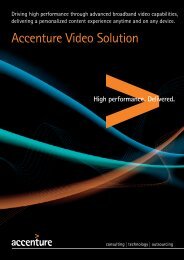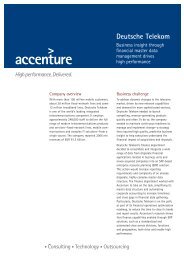Analytics Culture: The Secret to Success
Analytics Culture: The Secret to Success
Analytics Culture: The Secret to Success
Create successful ePaper yourself
Turn your PDF publications into a flip-book with our unique Google optimized e-Paper software.
A quick scan of how high-performing<br />
organizations use analytics answers<br />
that question. At Harrah’s, now<br />
Caesars Entertainment, service<br />
delivery metrics, such as the average<br />
time it takes <strong>to</strong> greet a cus<strong>to</strong>mer or<br />
<strong>to</strong> deliver a drink, are reported <strong>to</strong><br />
management on Sunday. <strong>The</strong> very next<br />
day, the property’s general manager<br />
can expect a call if the revenues are<br />
down compared <strong>to</strong> the same week the<br />
previous year. 2<br />
After an analysis of its loyalty<br />
program data showed that 7% of<br />
cus<strong>to</strong>mers were responsible for 43%<br />
of its sales, Best Buy redesigned its<br />
s<strong>to</strong>re layout <strong>to</strong> meet the needs of<br />
those loyal cus<strong>to</strong>mers. Further, this<br />
giant retailer quantified the value of<br />
employee engagement <strong>to</strong> cus<strong>to</strong>mers’<br />
in-s<strong>to</strong>re experience — a 0.1% increase<br />
in engagement is worth more than<br />
$100,000 in a s<strong>to</strong>re’s annual income —<br />
<strong>to</strong> inform its investments in the<br />
workforce. 3<br />
Quick action is a distinguishing<br />
feature of examples such as these.<br />
High performers do not simply gather<br />
and analyze data; they use the<br />
resulting insights <strong>to</strong> make smarter<br />
decisions faster. <strong>The</strong>ir leaders are in<br />
synch on how <strong>to</strong> employ analytics<br />
in the service of their strategy, and<br />
that vision percolates down through<br />
the organization. As a result, middle<br />
managers measure the right metrics,<br />
make decisions based on the best<br />
data available, and understand the<br />
significance of immediate action on<br />
the basis of those decisions.<br />
No technological solution, simply<br />
layered on <strong>to</strong>p of existing processes<br />
and culture, can achieve these results.<br />
Further, existing analytical talent in<br />
organizations rapidly grows frustrated<br />
with the added complexity. As one<br />
market researcher said, “We buy <strong>to</strong>ns<br />
of data on the consumer products<br />
market. We analyze the hell out of<br />
it. <strong>The</strong> problem is, we don’t change<br />
anything as a result of it.” 4<br />
Access <strong>to</strong> robust data is essential <strong>to</strong><br />
progress <strong>to</strong>ward analytical maturity.<br />
<strong>The</strong> value of the data is unlocked,<br />
however, when companies develop<br />
the capabilities <strong>to</strong> analyze what<br />
they gather. Do your employees<br />
know how <strong>to</strong> use scenario-based or<br />
workflow analysis <strong>to</strong>ols? Can they<br />
overcome organizational barriers<br />
and build momentum behind their<br />
positions? Capabilities such as these<br />
are necessary <strong>to</strong> drive transformative<br />
change fueled by analytics.<br />
As talent is hired and capabilities<br />
expand, pockets of analytical<br />
excellence develop in companies.<br />
Typically, however, these pockets<br />
produce little of strategic value<br />
because their scope is bounded by<br />
their unit or department. Opportunities<br />
that require multifunctional<br />
involvement are missed.<br />
Contrast that scenario <strong>to</strong> one of a<br />
high-performing organization with<br />
a culture that understands and<br />
celebrates the capabilities required <strong>to</strong><br />
win with analytics. In a culture such<br />
as this, respect for data coupled <strong>to</strong> a<br />
pervasive curiosity results in people<br />
asking questions such as, “Do we think<br />
this is true, or do we know?” 5 This<br />
is the key <strong>to</strong> success — the “secret<br />
sauce” — of analytics competi<strong>to</strong>rs. Due<br />
<strong>to</strong> the hard work required <strong>to</strong> build and<br />
maintain such an analytics culture,<br />
succeeding in this endeavor raises the<br />
table stakes in the market. Accenture<br />
uses the term “organizational<br />
effectiveness” <strong>to</strong> structure the<br />
multifaceted endeavors required <strong>to</strong><br />
foster an analytics culture.<br />
One facet of organizational<br />
effectiveness, for example, is<br />
promoting and reinforcing <strong>to</strong>p leaders<br />
with analytical vision, passion, and the<br />
ability <strong>to</strong> nurture leaders at all levels.<br />
Another is developing, engaging, and<br />
organizing talent with the right skill<br />
sets. <strong>The</strong> design of the operating model<br />
and the processes used <strong>to</strong> problem<br />
solve and execute at a strategic level<br />
are covered by this term, as are the<br />
processes and software required <strong>to</strong><br />
embed analytical <strong>to</strong>ols, methods, and<br />
behaviors. <strong>The</strong> magic occurs when the<br />
interpersonal and process strengths of<br />
an innovative, results-focused culture<br />
are combined with the technical and<br />
data-mining skills required <strong>to</strong> deliver<br />
high performance.<br />
3



